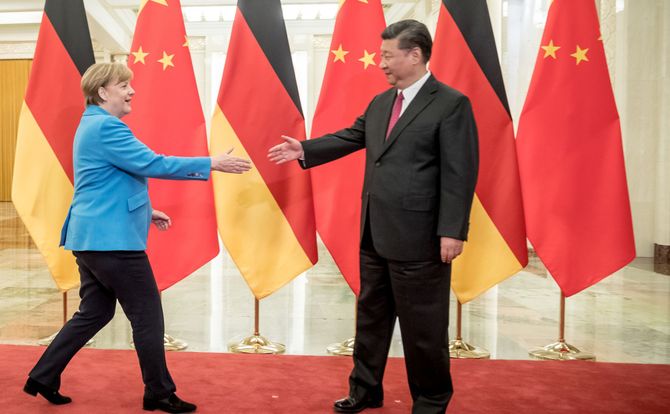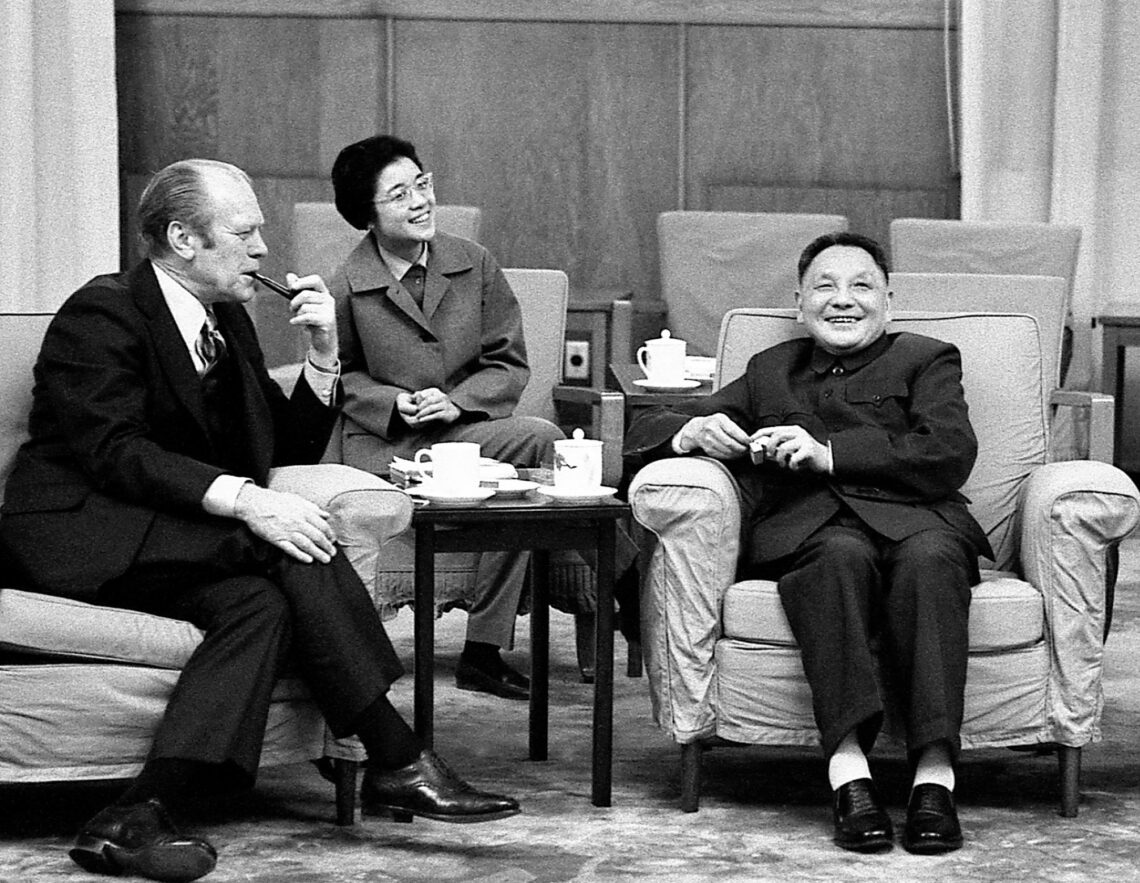Europe’s China policy challenge
As it tries to mitigate the effects of the trade war, China is seeking more partners in the West. EU could benefit greatly – if it could speak with one voice. China is exploiting divisions in the EU, intensifying its relations with cash-strapped states.

In a nutshell
- The trade war has revealed China’s serious economic vulnerabilities
- China is turning to a “soft” foreign policy to soften the blow
- Europe has a chance to engage China and steer it toward more reform
Though the United States and China declared a “cease-fire” in their trade war at the G20 summit in Buenos Aires last December, the tug-of-war between the two global powers is by no means over. The announcement did, however, mark an important adjustment in China’s foreign policy. Despite the two countries putting forth very different accounts of the talks between President Donald Trump and President Xi Jinping, it is clear that President Xi made significant concessions to his rival. Beijing promised to find solutions to several key sticking points, such as forced technology transfer and intellectual property (IP) rights violations, within three months.
China’s economy has been crisis-prone over the past year, but the trade war has really cornered the Chinese leadership. Growing debts are giving local governments and state-owned enterprises big headaches, the private sector suffers from unfair treatment (especially in terms of lending), and the population’s purchasing power has remained stagnant.
‘Be humble’
Now, the trade war has created new problems: more companies are closing or moving to neighboring countries, and the number of unemployed, especially among migrant workers and young graduates, is rising rapidly. Shortly before the Trump-Xi meeting in Argentina, the Communist Party headquarters warned in two internal documents at the end of last year that its cadres should brace for even harder economic times.
When the trade war broke out, Beijing did not take the Trump administration seriously. It reflexively implemented tit-for-tat measures. Over time, the Chinese leadership became alarmed when President Trump tightened the screws with the tariffs. In mid-June, a high-ranking think-tank delegation from China was in Washington. At a meeting with U.S. Deputy Secretary of State John J. Sullivan, the delegation asked what message it should convey to China’s decision makers. Mr. Sullivan’s reply consisted of two words: “Be humble.”
Though laconic, this answer has a loaded meaning for the Chinese: 40 years ago, Deng Xiaoping began his “reform and opening up” policy. His mantra was that China should remain modest and inconspicuous on the world stage. China benefited greatly from this attitude: The West has brought the Chinese not only capital, but also know-how and technology. The world was witnessing an economic miracle accompanied by a great change in living standards, a historical rarity.
The question here is how to position this rising star in the world 40 years later. Since 2016, China has been assertive, even arrogant, in its foreign policy. The Chinese leadership under President Xi Jinping believed that Deng’s mantra, “Hide your strength and bide your time,” was no longer the most viable approach and that China had already reached a high-ranking status within the current world order. Shortly before the trade war, there was a prevailing opinion in China that the country had already overtaken the U.S., or at least that it had achieved economic parity. The propaganda film “Amazing China” even boasted about four new national inventions. Among them were high-speed railways, a technology essentially borrowed from the West but shamelessly described as China’s own innovation.
President Trump’s tariff threats were a cold shower that shocked the Chinese leadership into sober introspection.
In 2015, to accelerate the economy’s transition up the value chain from mass production of cheap goods to high productivity and high-tech manufacturing, the Chinese government put forward the “Made in China 2025” plan, which set goals for technological development. One of the plan’s key concepts was that China should seek shortcuts – including poaching talent, high-tech theft and clandestine forced technology transfer, – to achieve dominance by 2025 in 10 industries, such as electric vehicles, artificial intelligence (AI), and quantum computing. The brain-drain aspect was highlighted in the so-called Thousand Talents Program, through which Beijing invites talented Chinese citizens living abroad (mostly in the U.S.), back to the motherland for cooperation. China took it for granted that the West would “tolerate” or even embrace its push to upgrade the economy through such measures.
Yet the trade war at heart is not just about U.S. trade deficits with China, but also concerns Beijing’s penchant for playing fast and loose with the global trade rules that the West has set. President Trump’s tariff threats were a cold shower that shocked the Chinese leadership from brazenness into sober introspection. China realized its vulnerability.
This realization led to serious deliberation and policy adjustment in August 2018, when the so-called Beidaihe meeting took place at a health resort near Beijing. During the meeting, the Propaganda Ministry was severely criticized for its haughty praise of the country’s “achievements.” The implication was that some leaders had decided it was time to return to Deng Xiaoping’s modesty in the country’s foreign policy. As is well known, Xi Jinping is not a great admirer of Deng, but the trade war has forced him to adopt the former leader’s mantra, at least tactically and temporarily. He knows that China’s exports to the U.S. will remain vital to its economy as long as domestic purchasing power cannot absorb these products on its own.
‘Soft’ diplomacy
To reduce tensions with the West, especially the U.S., China opted for an active but “soft” foreign policy. Through this “soft” diplomacy, Beijing will try to accommodate President Trump’s requirements, while cultivating new “allies” throughout the developed world to guard against a worst-case scenario in the trade war with the U.S. For example, the Chinese government has recently declared its intention to cooperate with Japan on projects related to the Belt and Road Initiative (BRI). Previously, China had claimed sole oversight in implementing such projects.
When Japanese Prime Minister Shinzo Abe, the leader of a historical Chinese enemy, visited Beijing last October, the Chinese leadership took the unusual step of rolling out the red carpet for his huge delegation. It was hoped that Japan would support China, as it did 40 years ago, when Deng Xiaoping visited Tokyo to solicit investment. China is also intensifying its soft diplomacy in Europe.

It is impossible that Beijing will return completely to the Deng era’s philosophy. Today’s China is a completely different country than in 1978. However, China’s timely foreign policy adjustment is already having an impact, as shown by December’s “cease-fire” in the trade war. Even after Huawei’s chief financial officer was taken into custody in Canada, the Chinese Ministry of Commerce is still claiming that Beijing believes in a positive outcome to the trade dispute.
Chinese foreign policy is an extension of domestic politics. The results of the Xi-Trump meeting indicate that among the country’s decision makers, advocates of reform and global trade are dominant. China will therefore take steps to fulfill the promises it made in Buenos Aires. Prior to the Xi-Trump meeting, the U.S. put forward 142 issues that must be resolved for the trade war to end. The Chinese leadership believes that most of the conditions can be met. Certainly, for the sake of saving face, Beijing will publicly declare that its actions are not concessions to its rival, but part of its own reform plan.
In the same context, the central government is considering changing how some local governments operate. Their policies are often responsible for forced technology transfer and the violation of IP rights, so reform could greatly reduce such practices. Yet one thing is certain: the Chinese Communist Party will never do anything to harm its core interests.
Beijing seems confident it will be able to resolve the dispute amicably by the end of February. This confidence is partly based on a belief that President Trump is equally motivated to find a solution, because he is at his wit’s end over his own domestic problems.
The adjustment of foreign policy definitively favors the reform camp.
China’s foreign policy adjustment definitively favors the reform camp, but the hawks in the country’s military and security organs will not remain silent. Nevertheless, for the purposes of further economic growth, President Xi has given the former preference. One clear sign of this decision was that China kept the South China Sea issue off the agenda of the Xi-Trump meeting.
The question now is: How should Europe respond to and make use of China’s changing foreign policy?
Europe’s opportunity
In the U.S., the prevailing view is that China has benefited too much from American goodwill over the past 40 years. Yet during these four decades, the communist system has not evolved into a liberal, market-based democracy. On the contrary, China’s modern authoritarianism is becoming increasingly technically sophisticated and economically powerful. The conclusion is that the U.S. should now terminate its “strategic engagement” and enter a phase of “strategic competition” with China. On a few issues, such as the South China Sea and cybersecurity, Beijing is even a full-fledged adversary.
In Europe, however, there is a diverse range of perspectives. While the European Commission pleads for a tougher stance toward Chinese high-tech theft and investments in critical infrastructure, some member states such as Portugal, Greece, Italy and Hungary are showing great sympathy for Beijing. Germany, Europe’s biggest exporter, regards China both as a partner and as a competitor. In short, it is probably wishful thinking to believe the EU can speak with one voice on China policy.
Constructive engagement and competition will accordingly be the tenor of politics toward China.
China is quite aware of these weaknesses, both in the EU’s central institutions and its member states, and is therefore taking a two-pronged approach: On one hand, Beijing is talking to the EU leadership, exemplified by its active participation at the Europa-Asia Summit in October last year. On the other, regardless of the European Commission’s grievances, Beijing is strengthening its relations with EU members in need of money.
There are still uncertainties to be resolved before the trade war can come to an end. No one wants to see it escalate. According to World Trade Organization Director-General Roberto Azevedo, a full-blown global trade war would shave 17 percentage points off growth in global trade and 1.9 percentage points off gross domestic product worldwide.
That is why Europeans are apt to capitalize on China’s foreign policy adjustments. Beijing very much hopes that as a guardian of multilateral globalization, the EU will show understanding for China’s side in the trade tussle.
This situation creates opportunities for European countries to gently nudge Beijing toward further reform. Europe is also well-positioned to develop viable policies for dealing with the BRI and Chinese expansion in the telecommunications sector, among other issues. Accordingly, the tenor of EU policies toward China is likely to be one of constructive engagement and competition. To achieve its goals, however, Europe must demonstrate sensitivity and expertise, along with a capacity for long-term strategic thinking and prompt action.







